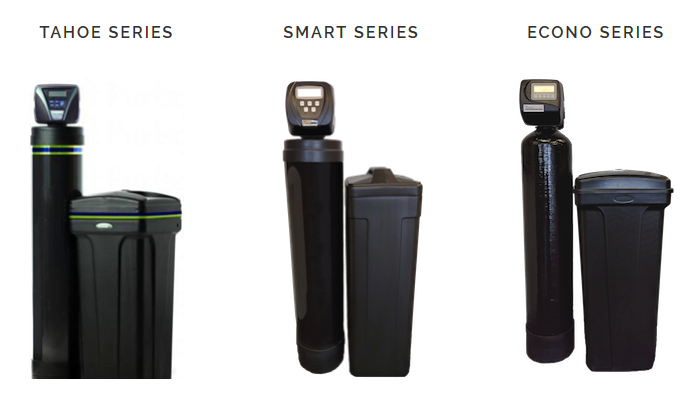Are you tired of dealing with stubborn residue on your dishes, dry skin after showering, or limescale buildup in your appliances? If so, it’s likely your water is hard.
Hard water contains high levels of minerals like calcium and magnesium, which can wreak havoc on your plumbing and personal comfort. In this guide, we'll discuss:
1. Understanding Hard Water and Its Impact
2. How to Deal With Hard Water
3. Different Scales of Water Filtration
Whether you're a homeowner or renter, understanding and tackling hard water issues can make a world of difference in your home's maintenance and your own well-being.
Contact the professional at WaterSmart if your water is hard and you’re not sure what to do.
1. Understanding Hard Water and Its Impact
Hard water is water that contains high levels of minerals, primarily calcium and magnesium. While it is not harmful to your health, it can cause various issues in your home and garden. Here's a closer look at how hard water can negatively impact different areas:
Garden
Hard water can affect plant growth by leaving mineral deposits on the soil and plants. These deposits can create a crust that prevents water from penetrating the soil, leading to poor plant health and stunted growth. Additionally, the minerals can interfere with the absorption of essential nutrients, further impacting the vitality of your garden.
Plumbing
Hard water can cause significant problems in your plumbing system. Over time, the minerals in hard water can build up inside pipes, reducing water flow and increasing the risk of clogs. This buildup, known as scale, can also affect appliances such as dishwashers, washing machines, and water heaters, reducing their efficiency and lifespan. In severe cases, the scale buildup can lead to costly repairs or replacements.
Home
In your home, hard water can leave unsightly stains on sinks, tubs, and fixtures. It can also make it more difficult to get dishes and laundry clean, as the minerals can interfere with soap and detergent effectiveness. Hard water can cause dry skin and hair, as the minerals can strip away natural oils, leading to irritation and dryness.
By understanding the negative , you can better appreciate the importance of finding effective solutions if your water is hard.
2. How to Deal with Hard Water
There are several methods to deal with hard water, each with its own advantages and disadvantages. Here are some of the most common solutions:
Brita Filter
Using a Brita filter is a simple and convenient way to reduce the mineral content in your drinking water. These filters are designed to remove impurities and reduce the hardness of the water. While they are effective for improving the taste and quality of drinking water, they are not suitable for treating large volumes of water or addressing hard water issues in other areas of your home.
Water Softener
Installing a water softener is one of the most effective ways to deal with hard water throughout your entire home. Water softeners work by exchanging the calcium and magnesium ions in hard water with sodium ions, effectively reducing the mineral content. This solution can help prevent scale buildup in pipes and appliances, improve the efficiency of soap and detergent, and provide softer skin and hair.
Tap Filter
Tap filters are another option for addressing hard water, particularly for drinking and cooking. These filters attach directly to your faucet and use various methods, such as activated carbon or ion exchange, to reduce the mineral content in the water. Tap filters are relatively inexpensive and easy to install, but they are not suitable for treating large volumes of water or addressing hard water issues throughout your home.
Installing a water softener is one of the best solutions if your water is hard.
3. Different Scales of Water Filtration
When it comes to water filtration, there are different scales of systems to consider, each with its own pros and cons. Here are two common options:
Single Brita Filter
A single Brita filter is a portable and convenient option for improving the quality of your drinking water. These filters are designed to fit into pitchers or dispensers, and they use activated carbon and ion exchange to reduce the mineral content and remove impurities.
Pros:
Easy to use and replace
Affordable
Portable
Cons:
Limited capacity
Only suitable for drinking water
Requires frequent replacement
Whole-House Filtration System
A whole-house filtration system is a comprehensive solution that treats all the water entering your home. These systems typically include a water softener and additional filters to remove impurities and reduce the mineral content.
Pros:
Provides soft water throughout your home
Prevents scale buildup in pipes and appliances
Improves the efficiency of soap and detergent
Reduces skin and hair dryness
Cons:
Expensive to install and maintain
Requires regular maintenance and replenishment of salt
May require professional installation
By understanding the different options for dealing with hard water, you can choose the solution that best fits your needs and budget.
Whether you opt for a simple Brita filter or a comprehensive whole-house system, addressing hard water issues can improve the quality of your water and the overall comfort of your home.
Call WaterSmart If Your Water is Hard
Since 1994, WaterSmart Systems has consistently offered its customers in the Kitchener, Waterloo, Cambridge, Guelph, Brantford, and surrounding areas innovative, quality products and excellent service.
We are a water softener and FULL plumbing service company that you can trust.
That trust extends to our products and our expertise to improve the quality of your home's water.
“I was impressed, even amazed, at how helpful and pleasant the staff at Watersmart Systems and Plumbing were in solving my water softener problems. They will be the first place I’ll go to with any water softener concerns.”




